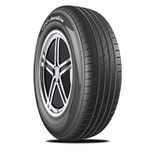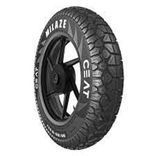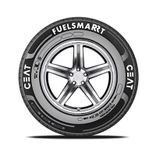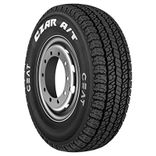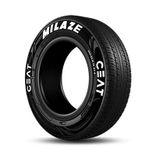Ad
Ad
Roll Safely this Summer- Top 5 Tips for your Car Tyres
Get ready to hit the road this summer with our top 5 tips for keeping your car tires in tip-top shape. From checking tire pressure to proper maintenance, our expert advice will ensure you roll safely and smoothly all season long.

When it comes to maintaining your car parts, tyres are usually overlooked and ignored. Despite being the most important part that not only holds your car's weight, but also is the only part that is connected to the road.
Summer heat affects your car tyre majorly, causing depletion on the tyre condition. Which could lead to lower fuel efficiency, compromised car performance, poor braking and affecting the overall vehicle control.
We have put together 5 maintenance tips for your car tyres that’ll keep you safe this summer.
1. Double check your Tyre Pressure-
Ad
Ad

The tyre pressure is constantly fluctuating in hot weather, and this can be really problematic. As, high temperatures can cause rubber tyres to expand or contract, resulting in changes in tyre pressure that can lead to under-inflation and even misalignment.
If a tyre is under-inflated, it may bulge outward and put pressure on the sidewalls of the tyre, which can lead to blowouts over time. Conversely, an over-inflated tyre with less surface contact can cause wear and tear on the treads, which can also be dangerous and may lead to bursting.
That's why it's important to check your tyre pressure regularly, using the recommended pressure levels found in your owner's manual or car maintenance guide.
2. Check the Tread of your Tyre-

Before you leave the port for your summer road trip, it's crucial to inspect your tyre treads. The separation of the tyre tread or track refers to the rubber on its surface, which can occur when the internal heat exceeds its limit, causing the bond between the tyre's belts and casing to break.
Worn-out tyre treads can have a significant impact on stopping distance, traction, and handling, particularly on wet roads. You can easily check the condition of your tyre treads using the "penny test." If the tread of your tyre is too shallow to fit a quarter of a coin, it is advisable to replace your tyre. When purchasing new tyres, be sure to buy from a reputable source to ensure quality and safety.
3. Consider Nitrogen over Regular Air-
Nitrogen is considered better than regular air for car tyres due to its larger molecule size, which results in maintaining appropriate tyre pressure for longer periods, improved fuel efficiency, better handling, and longer tyre life.
Oxygen can cause the rubber in tyres to deteriorate over time, which can lead to cracking, splitting, and other types of damage. Nitrogen is an inert gas, which means it does not react with other substances or cause oxidation.
More importantly, nitrogen is less affected by temperature changes than regular air, which can help maintain consistent tyre pressure in extreme hot or even cold conditions.
4. Rotate your Tyres-

Rotating your car tyres involves moving them from one position on the vehicle to another. This helps to distribute the wear more evenly across all four tyres, which can help extend their life. When tyres are left in the same position for too long, they can develop uneven wear patterns.
By rotating your tyres every 8,000 to 10,000 kilometers, you can avoid these issues and help ensure that your tyres wear evenly over time. This can help increase their tread life, and can also help provide a smoother and more comfortable ride on the road.
5. Quick checks-

The valves on your tyres are crucial for maintaining proper tyre pressure and preventing leaks. It's important to check that your valves are in good condition and have their caps securely in place. If a valve cap is missing or damaged, it should be replaced as soon as possible to protect the valve from dust, water, and mud.
Regularly washing and waxing your tyres can help protect them from the effects of summer heat. This can prevent them from drying out and wearing down too quickly.
Finally, experiencing a punctured tyre in the middle of a hot summer day and crawling to find a puncture shop can be a dreadful experience for anyone. To avoid such a site, make sure you do all these mentioned tips on your spare tyre as well.
More Articles

Best Low Maintenance SUV Cars Under 20 Lakh in India 2025
Looking for an SUV that's budget-friendly and easy to maintain? Discover the best low-maintenance SUVs under ₹20 lakh in India for 2025, including top models with great mileage, reliability, and affordable service costs.
06-May-2025 11:02 AM
Read Full Article
Best Low Maintenance SUV Cars Under 20 Lakh in India 2025
Looking for an SUV that's budget-friendly and easy to maintain? Discover the best low-maintenance SUVs under ₹20 lakh in India for 2025, including top models with great mileage, reliability, and affordable service costs.
06-May-2025 11:02 AM
Read Full Article
Best Cruiser Bikes Under 10 Lakh Rupees in India 2025: Top Picks for Style and Comfort
Explore the best cruiser bikes under ₹10 lakh in India for 2025. Discover top models that offer a perfect blend of style, performance, and long-distance comfort.
06-May-2025 06:32 AM
Read Full Article
Best Cruiser Bikes Under 10 Lakh Rupees in India 2025: Top Picks for Style and Comfort
Explore the best cruiser bikes under ₹10 lakh in India for 2025. Discover top models that offer a perfect blend of style, performance, and long-distance comfort.
06-May-2025 06:32 AM
Read Full Article
Complete Guide to Lubricants for Passenger Vehicles: Cars, Bikes & Scooters
Discover the best lubricants for cars, bikes, and scooters. Improve performance, mileage, and engine life with expert tips.
30-Apr-2025 07:18 AM
Read Full Article
Complete Guide to Lubricants for Passenger Vehicles: Cars, Bikes & Scooters
Discover the best lubricants for cars, bikes, and scooters. Improve performance, mileage, and engine life with expert tips.
30-Apr-2025 07:18 AM
Read Full Article
Top 10 Premium Electric Cars in India & The Best Luxury EVs to Buy
Explore the top 10 premium electric cars in India, offering luxury, performance, and cutting-edge technology. Find the best EVs from brands like Audi, BMW, Mercedes, Porsche, and more.
03-Apr-2025 07:39 AM
Read Full Article
Top 10 Premium Electric Cars in India & The Best Luxury EVs to Buy
Explore the top 10 premium electric cars in India, offering luxury, performance, and cutting-edge technology. Find the best EVs from brands like Audi, BMW, Mercedes, Porsche, and more.
03-Apr-2025 07:39 AM
Read Full Article
Royal Enfield’s Classic Legacy & A Journey Through Time and Innovation
Discover the rich legacy of Royal Enfield’s Classic series, from the first-generation models to the latest Classic 650. Explore its timeless design, powerful performance, and evolution through the years.
01-Apr-2025 08:48 AM
Read Full Article
Royal Enfield’s Classic Legacy & A Journey Through Time and Innovation
Discover the rich legacy of Royal Enfield’s Classic series, from the first-generation models to the latest Classic 650. Explore its timeless design, powerful performance, and evolution through the years.
01-Apr-2025 08:48 AM
Read Full Article
The Xtreme 250R & Xpulse 210: A New Benchmark in Performance and Versatility
Hero MotoCorp elevates its game with the Xtreme 250R and Xpulse 210, two motorcycles designed to set new benchmarks in performance and versatility.
26-Mar-2025 02:12 PM
Read Full Article
The Xtreme 250R & Xpulse 210: A New Benchmark in Performance and Versatility
Hero MotoCorp elevates its game with the Xtreme 250R and Xpulse 210, two motorcycles designed to set new benchmarks in performance and versatility.
26-Mar-2025 02:12 PM
Read Full ArticleAd
Ad






